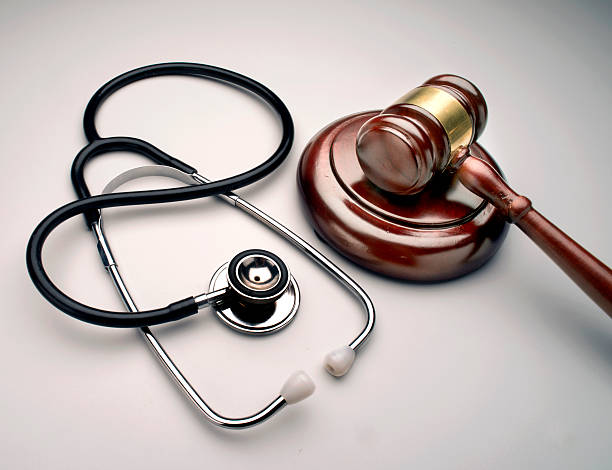Medical law and ethics are two different fields that are often taught together in medical schools. While they share some similarities, they are distinct from each other and serve different purposes. Medical law refers to the legal rules and regulations governing the practice of medicine, while medical ethics refers to the principles and values that guide healthcare professionals in their interactions with patients.
One of the main differences between medical law and ethics is that medical law is enforceable, while medical ethics is not.
Medical law is created by the government and enforced by the legal system, while medical ethics is based on moral principles and is enforced by professional organizations.
Healthcare professionals who violate medical law can face legal consequences, such as losing their license to practice medicine or being sued for malpractice.
On the other hand, healthcare professionals who violate medical ethics may face disciplinary action from their professional organization, but they are not subject to legal penalties.
The relationship between medical law and ethics is complex, and there are often situations where they conflict with each other.
For example, medical law may require healthcare professionals to disclose certain information to patients, while medical ethics may require them to keep that information confidential. In these situations, healthcare professionals must navigate the tension between these two fields and make decisions that are in the best interests of their patients.
What is Medical Law?
Medical law refers to the legal principles, rules, and regulations that govern the practice of medicine and healthcare. Medical law is a complex and ever-changing field that is influenced by a variety of factors, including statute and common law, legal duties of doctors, and government regulations.
Statute and Common Law
Statute law refers to the laws that are passed by the government, while common law refers to the legal principles that are established by the courts. In the context of medical law, statute law includes the laws that govern the practice of medicine, such as the Medical Act, while common law includes the legal principles that have been established through court cases, such as the duty of care owed by doctors to their patients.
Legal Duties of Doctors
Doctors have a number of legal duties that they must fulfill in order to provide safe and effective medical care to their patients. These duties include a duty to provide care that meets the standard of care, a duty to obtain informed consent from their patients, and a duty to maintain patient confidentiality.
Government Regulations
Government regulations play a significant role in shaping medical law. These regulations are designed to protect the public by ensuring that healthcare providers meet certain standards of care. For example, regulations may require that healthcare providers obtain certain licenses or certifications in order to practice, or they may require that healthcare facilities meet certain safety standards.
In conclusion, understanding medical law is essential for healthcare providers who want to provide safe and effective care to their patients. By understanding the legal principles that govern the practice of medicine, healthcare providers can ensure that they are providing care that meets the highest standards of quality and safety.
What is Medical Ethics?
Medical ethics is a branch of ethics that deals with moral issues and values in the healthcare field. It provides a framework for medical professionals to make decisions in situations where there are conflicting values or interests. Medical ethics is based on a set of principles that guide medical professionals in their decision-making process.
Principles of Medical Ethics
The four principles of medical ethics are autonomy, beneficence, non-maleficence, and justice. Autonomy refers to the right of patients to make their own decisions about their healthcare. Beneficence refers to the duty of medical professionals to act in the best interests of their patients. Non-maleficence refers to the duty of medical professionals to avoid harming their patients. Justice refers to the fair distribution of healthcare resources.
Ethical Responsibilities of Medical Professionals
Medical professionals have ethical responsibilities to their patients, colleagues, and society. They have a duty to provide competent and compassionate care to their patients. They also have a duty to respect the autonomy of their patients and to obtain informed consent before providing treatment. Medical professionals have a duty to maintain confidentiality and to protect the privacy of their patients. They also have a duty to report suspected abuse or neglect.
Ethical Issues in Healthcare
There are many ethical issues in healthcare, including end-of-life care, reproductive rights, and access to healthcare. End-of-life care involves decisions about when to withhold or withdraw life-sustaining treatment. Reproductive rights involve decisions about contraception, abortion, and assisted reproduction. Access to healthcare involves issues of distributive justice and the allocation of scarce resources.
In conclusion, medical ethics provides a framework for medical professionals to make decisions in situations where there are conflicting values or interests. The principles of medical ethics guide medical professionals in their decision-making process. Medical professionals have ethical responsibilities to their patients, colleagues, and society. There are many ethical issues in healthcare, including end-of-life care, reproductive rights, and access to healthcare.
The Interplay Between Medical Law and Ethics
Medical law and ethics are two distinct, yet interconnected fields that govern the practice of medicine. Medical law refers to the legal framework that governs the practice of medicine, while medical ethics refers to the moral principles and values that guide the conduct of healthcare professionals. While medical law and ethics are often thought of as separate entities, they are closely intertwined and have a significant impact on how healthcare is delivered.
Informed Consent
One of the areas where medical law and ethics intersect is in the concept of informed consent. Informed consent is the process by which a patient is informed about the benefits and risks of a medical procedure or treatment, and gives their consent to undergo the procedure or treatment. Informed consent is a legal requirement in most countries, and failure to obtain informed consent can result in legal action.
From an ethical perspective, informed consent is a key component of patient autonomy and respect for patient rights. Patients have the right to make informed decisions about their healthcare, and healthcare professionals have a duty to provide them with the information they need to make those decisions.
Treatment Decisions
Another area where medical law and ethics intersect is in treatment decisions. Healthcare professionals are required to make treatment decisions that are in the best interests of their patients. However, in some cases, the best interests of the patient may conflict with their wishes or beliefs.
From a legal perspective, healthcare professionals are required to follow the standard of care, which is the level of care that a reasonably prudent healthcare professional would provide under similar circumstances. Failure to follow the standard of care can result in legal action.
From an ethical perspective, healthcare professionals have a duty to respect patient autonomy and to consider the patient’s wishes and beliefs when making treatment decisions. This can sometimes create ethical dilemmas, particularly when the patient’s wishes conflict with what the healthcare professional believes is in their best interests.
Life Support
The use of life support is another area where medical law and ethics intersect. Life support refers to medical interventions that are used to keep a patient alive when their body is unable to function on its own. This can include mechanical ventilation, dialysis, and artificial nutrition and hydration.
From a legal perspective, healthcare professionals are required to follow the standard of care when using life support. They are also required to obtain informed consent before using life support.
From an ethical perspective, the use of life support can raise questions about the value of life and the appropriate use of medical resources. Healthcare professionals have a duty to consider the patient’s wishes and beliefs when making decisions about the use of life support.
Capital Punishment
Capital punishment is another area where medical law and ethics intersect. Healthcare professionals may be involved in the administration of capital punishment, either by providing medical care to the condemned or by participating in the execution itself.
From a legal perspective, the use of medical professionals in the administration of capital punishment is controversial, and there are legal and ethical questions about the appropriateness of their involvement.
From an ethical perspective, the use of medical professionals in the administration of capital punishment raises questions about the role of healthcare professionals in society and the conflict between their duty to care for patients and their duty to uphold the law.
In conclusion, medical law and ethics are two distinct but interconnected fields that play a critical role in the practice of medicine. From informed consent to treatment decisions, life support, and capital punishment, medical law and ethics have a significant impact on how healthcare is delivered and the rights of patients. Healthcare professionals must navigate the complex interplay between medical law and ethics to provide the best possible care for their patients.
Conflicts and Resolutions
Conflicts between Law and Ethics
There are times when practicing physicians may encounter a situation where what the law requires conflicts with what the AMA Code of Medical Ethics says about how physicians must conduct themselves. The relationship between ethics and law is complex, and it is not uncommon for there to be conflicts between the two. For instance, a law may require a physician to disclose a patient’s confidential medical information, whereas the AMA Code of Medical Ethics prohibits such disclosure.
Role of AMA Council on Ethical and Judicial Affairs
The AMA Council on Ethical and Judicial Affairs (CEJA) is responsible for interpreting the AMA Code of Medical Ethics and providing guidance on ethical issues that arise in medical practice. When there is a conflict between the law and the AMA Code of Medical Ethics, physicians can turn to CEJA for guidance. CEJA’s opinions are not binding, but they are influential and are often cited in legal cases involving medical ethics.
Guidance for Ethical Decision-Making
When faced with a conflict between the law and medical ethics, physicians should follow the guidance provided by CEJA and the AMA Code of Medical Ethics. The AMA Code of Medical Ethics provides guidance on a wide range of issues, including informed consent, confidentiality, and end-of-life care. Physicians should also consider the ethical principles of autonomy, beneficence, non-maleficence, and justice when making decisions about patient care.
In addition, physicians should seek legal advice when necessary to ensure that they are complying with the law while also upholding their ethical obligations. It is important to note that in some cases, a physician may be required to violate the AMA Code of Medical Ethics in order to comply with the law. In such cases, the physician should document the reasons for their actions and seek guidance from CEJA or legal counsel.
Overall, conflicts between medical law and ethics can be challenging for physicians, but by following the guidance provided by CEJA and the AMA Code of Medical Ethics, physicians can navigate these conflicts and ensure that they are providing the best possible care for their patients while upholding their ethical obligations.
Medical Law and Ethics in Education
Medical law and ethics are essential components of medical education. Medical students are required to take courses on medical law and ethics to understand the legal and ethical frameworks that govern medical practice. These courses aim to provide students with knowledge and skills to navigate the complex and ever-changing landscape of healthcare law and ethics.
Courses on Medical Law and Ethics
Medical law courses typically cover topics such as medical malpractice, informed consent, patient rights, and medical liability. These courses are designed to help students understand the legal obligations and responsibilities of healthcare providers. They also provide students with an understanding of the legal consequences of non-compliance with healthcare laws and regulations.
Medical ethics courses, on the other hand, focus on the ethical principles and values that guide medical practice. These courses explore topics such as autonomy, beneficence, non-maleficence, and justice. They aim to help students develop a moral framework for making ethical decisions in clinical practice.
In addition to traditional classroom lectures, many medical schools incorporate experiential learning into their medical law and ethics courses. For example, students may participate in mock trials or role-playing exercises to simulate real-life legal and ethical dilemmas.
Reflection and Learning
Reflection is an essential component of medical education, particularly in the context of medical law and ethics. Reflection allows students to examine their own beliefs and values and to consider how these beliefs and values influence their clinical decision-making.
In medical law and ethics courses, reflection can take many forms. For example, students may be asked to reflect on a particular case or scenario and consider how they would respond in a similar situation. They may also be asked to reflect on their own experiences as patients or healthcare providers and consider how these experiences have influenced their understanding of medical law and ethics.
Overall, medical law and ethics courses play a critical role in preparing medical students for the legal and ethical challenges they will face in clinical practice. Through a combination of classroom lectures, experiential learning, and reflection, students develop the knowledge and skills necessary to navigate the complex and ever-changing landscape of healthcare law and ethics.
Conclusion
In conclusion, the relationship between medical law and ethics is complex and multifaceted. While medical ethics and law are often taught together, they are distinct fields with different objectives and approaches. Medical ethics is concerned with the moral principles and values that guide medical practice, while medical law is concerned with the legal rules and regulations that govern medical practice.
One of the key differences between medical law and ethics is that medical law is enforceable, while medical ethics is not. Medical law is created by the government and enforced by the legal system, while medical ethics is based on moral principles and values that are not necessarily enforceable by law.
Despite these differences, there is a close relationship between medical law and ethics. Medical law often reflects ethical principles and values, such as the need to obtain a patient’s informed consent before providing medical treatment. Similarly, ethical principles and values often inform legal decisions in medical cases, such as the duty to provide care and avoid harm.
One of the challenges of medical law and ethics is resolving conflicts between the two. In some cases, the law may require conduct that is ethically unacceptable, or ethical principles may conflict with legal obligations. In these cases, healthcare professionals must navigate complex legal and ethical frameworks to make decisions that are in the best interests of their patients.
Overall, while medical law and ethics are distinct fields, they are closely intertwined and essential to the practice of medicine. Healthcare professionals must be knowledgeable about both medical law and ethics in order to provide the best possible care to their patients while also complying with legal requirements and ethical standards.
YOU SHOULD ALSO READ:
- Is It Legal to Euthanize a Healthy Dog? A Clear and Neutral Answer
- How Many Times Can You Appeal a Medical Claim? Explained
- What Are The Elements of a Medical Negligence Claim
- How Much Compensation Can You Claim for Death by Medical Negligence?
- Medical Negligence and Consumer Protection Act: What You Need to Know












